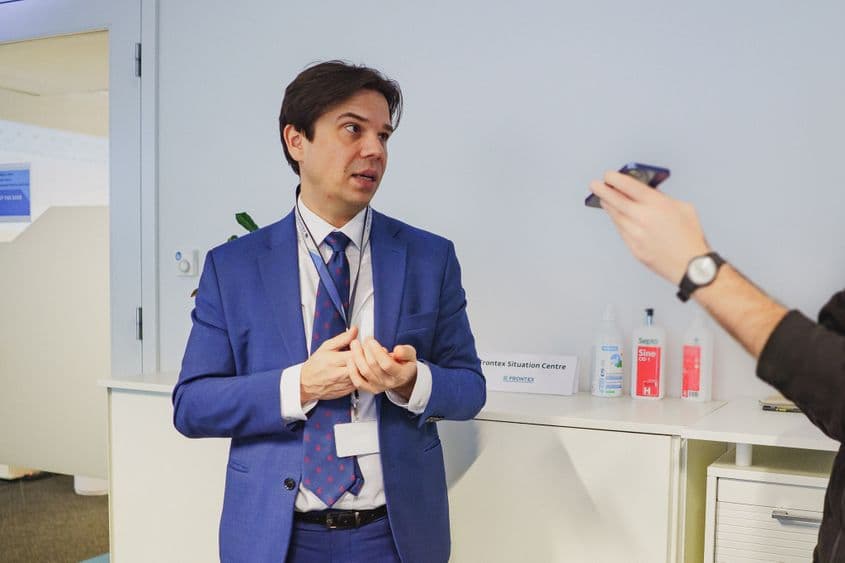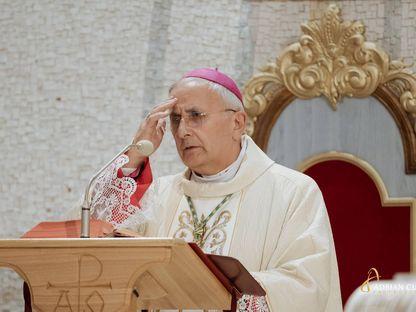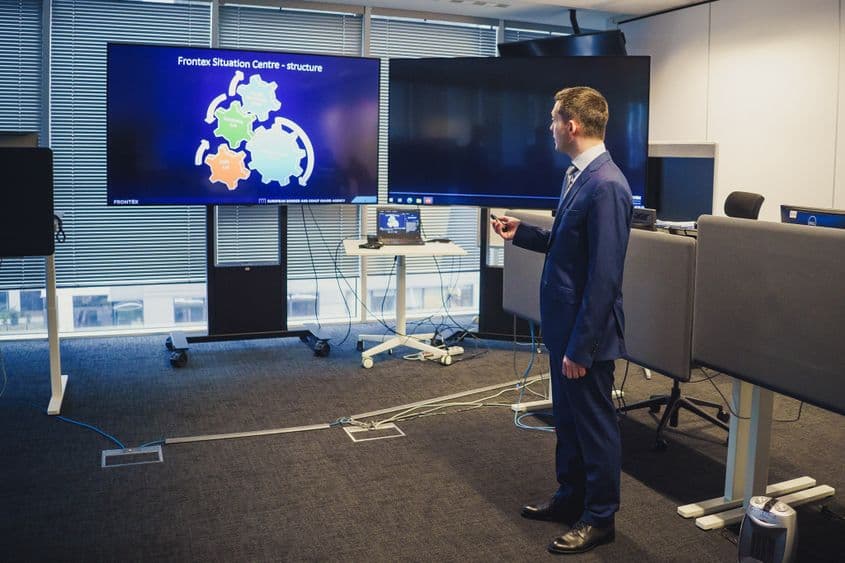A Romanian Frontex officer explains to PressOne how EU border surveillance works. Photo: Ioana Epure
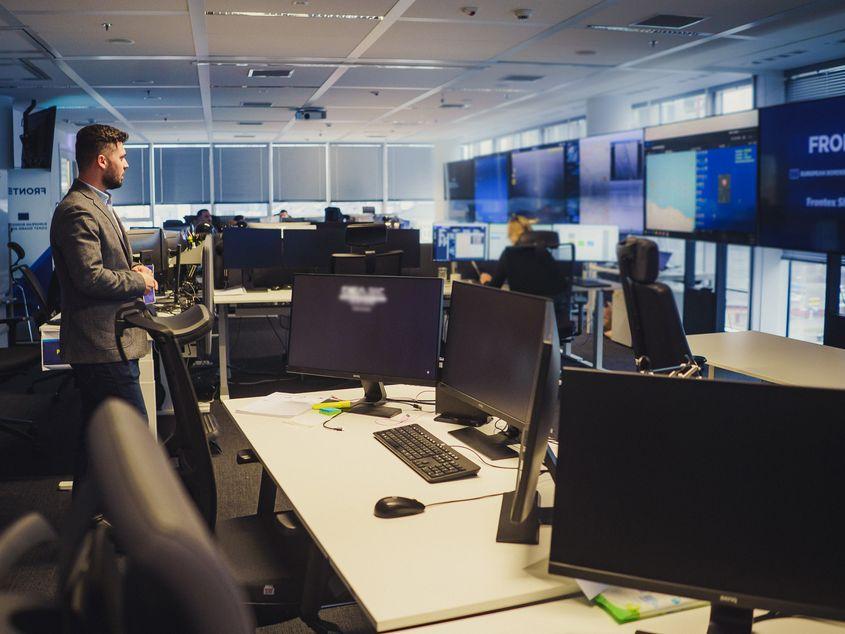
A Romanian Frontex officer explains to PressOne how EU border surveillance works. Photo: Ioana Epure
09/12/2022
Frontex: "We have nothing to do with the vote on Romania's admission into the Schengen space. We are not the source of the data" | Correspondence from Warsaw
"We have nothing to do with the vote on Romania's accession to the Schengen area," states, from the beginning, the representative of Frontex, the European Border and Coast Guard Agency, who understands the tensions created by the outcome of the Justice and Home Affairs Council (JHA) vote on Thursday, that blocked Bulgaria and Romania's entry into the Schengen area.
From the 6th floor of the Warsaw headquarters, Frontex representatives (including staff from Romania) explain how the European agency monitors EU borders and migration flows, how it responds to acute crisis situations or how it communicates with national authorities.
Even so, it is precisely the data provided by Frontex that has been invoked by the authorities in Bucharest, in an attempt to demonstrate to the Austrian government that an "Eastern Balkans route" that includes Romania does not really exist.
Around 75,000 "illegal immigrants" have allegedly entered Austria unregistered, most of them via Romania, Vienna claimed. However, the Frontex screens, on which we watch in real time how the region's borders are monitored by plane and drone, haven't depicted, today or in the past, the silhouettes of tens of thousands of people crossing the border illegally, as Chancellor Karl Nehammer claims.
How can a member state determine exactly by which route asylum seekers entered the country? PressOne reporters asked Piotr Świtalski, Frontex spokesperson.
PressOne: In Frontex communications, there is no mention of a "Eastern Balkans" route that includes Romania in any way. How did this route come about, separate from all Frontex assessments so far?
I don't know where this is coming from.
PressOne: But is there an "Eastern Balkans" route? It has been invoked by the Austrian government as a pretext for refusing Romania access to the Schengen area.
Mulți ne citesc, puțini ne susțin. Fără ajutorul tău, nu putem continua să scriem astfel de articole. Cu doar 5 euro pe lună ne poți ajuta mai mult decât crezi și poți face diferența chiar acum!
We will not comment on the Austrian government's position. What we are using is the Western Balkan route, the Central Mediterranean, the Eastern Mediterranean, the Western Mediterranean. We have certain routes. It's a name I don't know.
We don't use this term at the moment. When you look at our reports, we have the Western Balkans. This is the term that we use.
PressOne: Frontex uses several means to gather data. Could one source be the people smugglers themselves, who end up giving evidence - otherwise an unconventional source?
Yes. Our officers gather intelligence through interviews. For example, when a migrant is apprehended, a boat is disembarked, there is an opportunity for the migrants to be interviewed. It's a voluntary interview, it's not an interrogation, exactly to find out smuggling routes, the modus operandi, what route they took, how much they paid the smugglers. This is intelligence gathering. On the smuggling networks as well, on criminal activity, on cross border crime activity.
PressOne: Are these reports based strictly on voluntary testimonies, or is this data corroborated with data from other sources or monitoring for a result as close to the truth as possible?
Predator in Robes: The Diocese of Iași and the Vatican Buried a Sexual Assault Committed by a Catholic Priest Against a Minor in Bacău, Failing to Alert Prosecutors
A Roman Catholic priest abused a 13-year-old girl in the parish where he served in Bacău County: the bishop of Iași knew about it, sent the case to the Vatican, and applied canonical sanctions, but did not notify the authorities, who only intervened later and sentenced him to prison.
Yes, our colleagues gather information from their sources, just like any investigators would do. We rely on as many sources as possible. Reliable sources. We fuse the information together, if it's surveillance activity, it's different information, if our officers are following a suspicious boat, they get information from their resources.
PressOne: How can a Member State, let's say Austria, determine exactly by which route asylum-seeking migrants came to that state?
This is exactly where our debriefing officers can help. We interview hundreds of migrants in order to build a better picture.
Un newsletter pentru cititori curioși și inteligenți.
Sunt curios
A Romanian Frontex officer explains how the Agency works during a crisis situation. Photo: Ioana Epure
PressOne: How many unregistered migrants passed through Bulgaria, Romania and Croatia in 2022?
The primary source of certain border activity is the country. So if you ask me what is Frontex data on this crossing, in this border region, I will tell you an answer, but this data most likely came from the member states. They are the best source, the most reliable, from all the sources that we can have. We use the information to build a better picture of Europe and some borders, but for the individual border actions, we get this information from the member states. They are the best place to have a situational picture.
PressOne: Then why did migrants prefer the Western Balkans route?
Many factors. First of all, maybe geographical. Location, proximity. Each migrant would have a certain set of reasons to choose a certain route or not. Same with smugglers. There are so many factors that contribute to a certain route being more or less active. Just take, for example, the Covid times. One of the reasons why certain routes were more favored than not was, for example, the Covid closures of borders. Certain borders were more open to Covid travel than others. This has affected certain routes.
The weather is another reason. On the Western Balkan route you see that migration stops the second the snow starts falling.
PressOne: Returning to the specific situation created by the vote on Schengen accession: two Member States, Romania and Austria, disagree on some data. In the middle, the European Commission is mediating to find a solution. What is Frontex's role in this specific situation and what does Frontex data show?
We are not the source of the data and numbers. The member states, or the Schengen associate state of the third country are the primary sources. They know their borders the best. These are their borders. We are there to support. We are not the primary sources. We gather different data, yes, of course - generally speaking, not speaking about this case - we gather data from our sources, but the member state, the country which protects a certain border, is the main, the best, the most reliable source to give the data.
And if there is a dispute between two countries, it is not our place to intervene, it's not our role.
PressOne: How will Frontex support the Republic of Moldova in the future? What kind of additional assistance could there be for them?
When Ukraine was attacked, we were prepared to support Romania and any neighboring country, but Moldova requested the EU for support. So in March 2022, in record time, the Commission negotiated the agreement on border management with Moldova, which allowed record deployment of Frontex staff and equipment to Moldova, supporting Moldovan authorities with border management. Border check, patrols, fighting cross border crime. And directly supporting the European Union, Romania in this case.
As the war continued, together with he Moldovan authorities, the EU established a hub to prevent any development in smuggling of weapons, for example, and trafficking human beings.
PressOne: Is Frontex involved in any way at this point in the surveillance of the Belarus-EU border?
Yes and no. We were last year, in 2021, when Lukashenko started the migration crisis. Lithuania requested us for what is called the rapid border intervention. It's a mechanism that member states can trigger, which is basically a rapid deployment force within two weeks. In this case it was less than two weeks, and we deployed over 100 officers, because Lithuania was facing a crisis and they said they needed support from the European Union.
Poland never requested our support to patrol the border, but we have several officers stationed at the border crossing points. And in Lithuania there was a rapid border intervention, over 100 officers, patrol cars, equipment and so on - at the height of the crisis, last year.
And now, as the crisis calmed down, although it is still tense, Lithuania said thank you, we do not require your assistance any longer, we are dealing with it ourselves and this has been going on for a couple of months. We are no longer patrolling the border.
PressOne: Migration to Europe is at its highest level since 2016, according to official data. Why? What triggered this new wave?
There are many factors. Geopolitical developments in the area, the lifting of Covid restrictions. During Covid, travel was almost halted. But some people were already on the move. A lot of migrants were basically stuck wherever they were. Covid restrictions were lifted, so people started moving again.
Any development in the Middle East could trigger something. Also, any development in the internal politics of a third country.
PressOne: It is against this backdrop that abuses of migrants are documented. What does a Frontex officer do if he or she witnesses the abuse of a migrant?
First of all there's the code of conduct, then there's the European law, international law. They are bound by this, they are trained. If they witness any potential violation, they are required, obliged by the law, under their moral or legal duty, to report this. First they report it internally, we have a system called "serious incident reporting", and there are various categories. Category one is potential violations of fundamental rights.
And whenever there is the slightest possibility that a serious incident that happened violated the fundamental rights, immediately the independent Fundamental Rights Office takes over the case. They conduct a data gathering - they interview the officer who saw that, they get a hold of all the information that they can and with this package, depending on what they have, there can be different scenarios.
PressOne: A group of international non-governmental organizations recently published an independent report citing thousands of abuses, including pushback. The Black Book of Pushbacks has even reached Volume II, which means the practice continues. What practical value, then, does Article 46 have, beyond rhetoric?
This year, I don't think we have applied it. However, with Article 46 there is a procedure. For example, in the case of Hungary several years ago, when the European Court of Justice ruled (that the Hungarian government was involved in push-back practices, n.red), we said we are withdrawing our operations from the land.
But we didn't say we are leaving Hungary altogether. For example, we still have teams who are tracking stolen vehicles, cross border crime. So it's not like Frontex completely withdrew from Hungary and forgot about it. No. We apply the law as it is and the ruling as it is.
PressOne: What is Frontex's intention to reform from within, as an organization, after the scandal involving former director Fabrice Leggeri, accused, among other things, of allegedly being involved in pushback operations?
The mechanism of how to deal with serious incident reports has changed. One of the changes is in terms of how to prevent, in the future, that individuals - not the organism, but individuals - can tweak the system to do what has happened in the past.
For example, if there is a potential violation of fundamental rights, this case is immediately handled by the fundamental rights office. The Fundamental Rights Office itself has increased when it comes to human resources and so on. Now we have 46 monitors, a year ago 20, the year before it was less, for a while there were no fundamental rights monitors.
PressOne: Are 46 enough?
The recommendation by the Parliament was of 40 monitors. We have 46.
PressOne: So this is the core of the reform?
This is one of the things we did. We have increased resources for internal control. We have increased transparency. We receive more and more requests for public information and access to public documents. I would say the culture also, in the agency, in terms of signaling, whistleblowers, has changed. There is a more inclusive and a more decentralized decision making structure.
PressOne: What happens if a Frontex officer is found to be violating fundamental rights or participating in such an operation?
If an officer is found to be violating any potential and fundamental rights, there are certain measures. Disciplinary, legal, an investigation - internal or a criminal investigation. This is hypothetical, but if an officer of Frontex is found to be violating any law - not just fundamental rights, but any law - there are certain procedures. Both disciplinary and legal.
PressOne: Has Frontex recorded such cases in the last two years?
I don't recall any instance when our officers participated in any such an activity. Like the reports that Lighthouse published two days ago (video images of migrants being held in a cage in Bulgaria, n.red): we immediately asked our fundamental rights officer, based on the information that we received, of course, please investigate, this is a serious accusation.
But if you believe that there is such a thing, please inform us, and it will be immediately investigated.
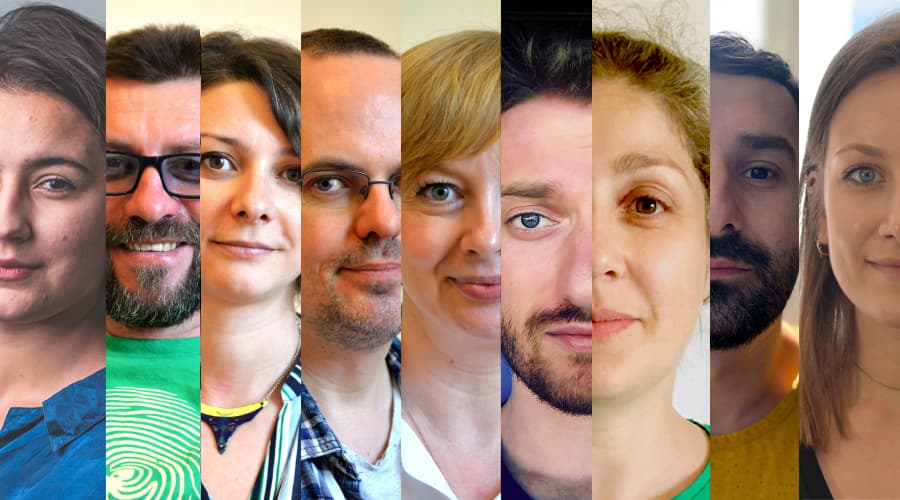
Avem nevoie de ajutorul tău!
Mulți ne citesc, puțini ne susțin. Asta e realitatea. Dar jurnalismul independent și de serviciu public nu se face cu aer, nici cu încurajări, și mai ales nici cu bani de la partide, politicieni sau industriile care creează dependență. Se face, în primul rând, cu bani de la cititori, adică de cei care sunt informați corect, cu mari eforturi, de puținii jurnaliști corecți care au mai rămas în România.
De aceea, este vital pentru noi să fim susținuți de cititorii noștri.
Dacă ne susții cu o sumă mică pe lună sau prin redirecționarea a 3.5% din impozitul tău pe venit, noi vom putea să-ți oferim în continuare jurnalism independent, onest, care merge în profunzime, să ne continuăm lupta contra corupției, plagiatelor, dezinformării, poluării, să facem reportaje imersive despre România reală și să scriem despre oamenii care o transformă în bine. Să dăm zgomotul la o parte și să-ți arătăm ce merită cu adevărat știut din ce se întâmplă în jur.
Ne poți ajuta chiar acum. Orice sumă contează, dar faptul că devii și rămâi abonat PressOne face toată diferența. Poți folosi direct caseta de mai jos sau accesa pagina Susține pentru alte modalități în care ne poți sprijini.
Vrei să ne ajuți? Orice sumă contează.
Share this



